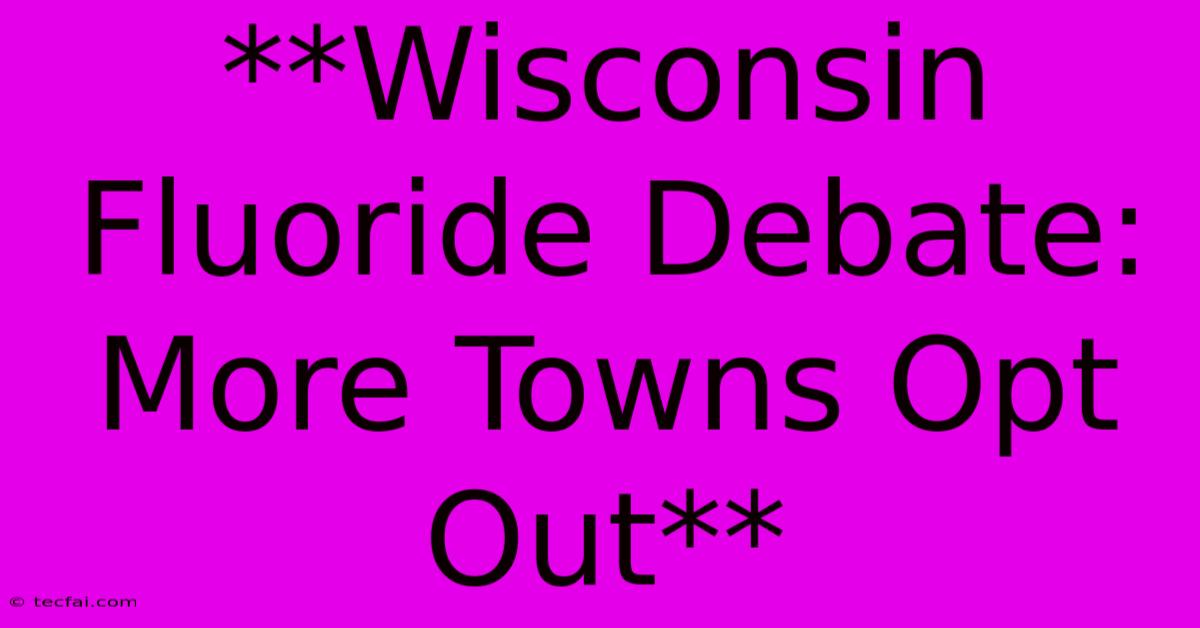**Wisconsin Fluoride Debate: More Towns Opt Out**

Discover more detailed and exciting information on our website. Click the link below to start your adventure: Visit Best Website tecfai.com. Don't miss out!
Table of Contents
Wisconsin Fluoride Debate: More Towns Opt Out
The debate surrounding community water fluoridation continues to simmer in Wisconsin, with a growing number of municipalities choosing to opt out of the practice. This decision, often fueled by concerns about individual liberties and potential health risks, pits public health officials against vocal community groups. Understanding the complexities of this issue requires examining the arguments on both sides and the evolving landscape of water fluoridation in the state.
The Case for Fluoridation: A Public Health Success Story
For decades, water fluoridation has been championed as a significant public health achievement. Proponents point to a substantial body of research demonstrating its effectiveness in preventing tooth decay, particularly among children. The Centers for Disease Control and Prevention (CDC) lists water fluoridation as one of the ten great public health achievements of the 20th century.
Advocates argue that fluoridation is a cost-effective and equitable way to improve oral health, benefiting everyone in the community, regardless of socioeconomic status. They emphasize that the amount of fluoride added to water is carefully regulated and poses minimal risk to healthy individuals. The benefits, they claim, far outweigh any potential drawbacks.
The Growing Opposition: Concerns and Controversies
Despite the long-standing support for fluoridation, a significant portion of the Wisconsin population expresses reservations. Concerns center around:
-
Individual Liberty: Many argue that the government shouldn't mandate the addition of any substance to their drinking water, asserting that it violates their right to choose what they consume. This argument resonates strongly with those who value individual autonomy and believe in limited government intervention.
-
Potential Health Risks: While the CDC maintains that the levels of fluoride in fluoridated water are safe, some individuals express worry about potential negative health effects, citing studies that link high fluoride intake to dental fluorosis (a cosmetic discoloration of teeth) and other potential health problems. It's important to note that these studies are often contested and the consensus among major health organizations remains in favor of fluoridation.
-
Cost and Effectiveness: While proponents highlight cost-effectiveness, some municipalities question the financial burden of maintaining fluoridation systems, particularly in smaller communities. Concerns also exist about the effectiveness of fluoridation in the face of changing dental hygiene practices and the availability of other fluoride sources, such as toothpaste.
The Shifting Landscape in Wisconsin
The recent trend of Wisconsin towns opting out of fluoridation highlights a growing movement questioning the long-held public health consensus. This shift is influenced by:
-
Increased Access to Information: The internet has made it easier for individuals to access information, including studies and opinions that challenge the traditional narrative on fluoridation. This increased access fuels the debate and empowers communities to make informed (or misinformed) decisions.
-
Grassroots Activism: Organized groups actively campaign against fluoridation, spreading information and influencing local politics. These campaigns often focus on individual liberty and potential health risks, effectively mobilizing opposition.
-
Political Polarization: The issue of fluoridation has become entangled in broader political debates, with some viewing it as a symbol of government overreach. This polarization makes finding common ground and reaching a consensus increasingly difficult.
The Path Forward: Balancing Public Health and Individual Rights
The ongoing debate in Wisconsin underscores the challenges of balancing public health goals with individual rights and concerns. Finding a path forward requires:
-
Transparent Communication: Public health officials must engage in clear and transparent communication, addressing concerns and providing accurate information about the benefits and risks of fluoridation. This includes actively addressing misinformation and engaging with concerned citizens.
-
Community Engagement: Meaningful dialogue and community engagement are crucial. Open forums and discussions should be held to allow for the expression of diverse perspectives and the exploration of alternative solutions.
-
Evidence-Based Policymaking: Decisions regarding water fluoridation should be based on the most up-to-date scientific evidence and informed by expert consensus. Policymakers need to navigate the complexities of the debate, ensuring decisions reflect both public health imperatives and respect for individual rights.
The future of water fluoridation in Wisconsin remains uncertain. As more towns opt out, the debate will likely intensify, demanding a thoughtful and nuanced approach that considers both the public health benefits and the concerns of individual citizens. The ongoing conversation necessitates a commitment to open dialogue, evidence-based decision-making, and a search for solutions that address the needs of all stakeholders.

Thank you for visiting our website wich cover about **Wisconsin Fluoride Debate: More Towns Opt Out** . We hope the information provided has been useful to you. Feel free to contact us if you have any questions or need further assistance. See you next time and dont miss to bookmark.
Featured Posts
-
England Vs Greece Live Result And Post Match Analysis
Nov 15, 2024
-
Dallas Vs Utah Oras At Paraan Ng Panonood
Nov 15, 2024
-
Australia Beats Pakistan 1st T20 I
Nov 15, 2024
-
Australia Wins 1st T20 I Vs Pakistan
Nov 15, 2024
-
Sri Lanka Left Coalition Wins Landslide Victory
Nov 15, 2024
